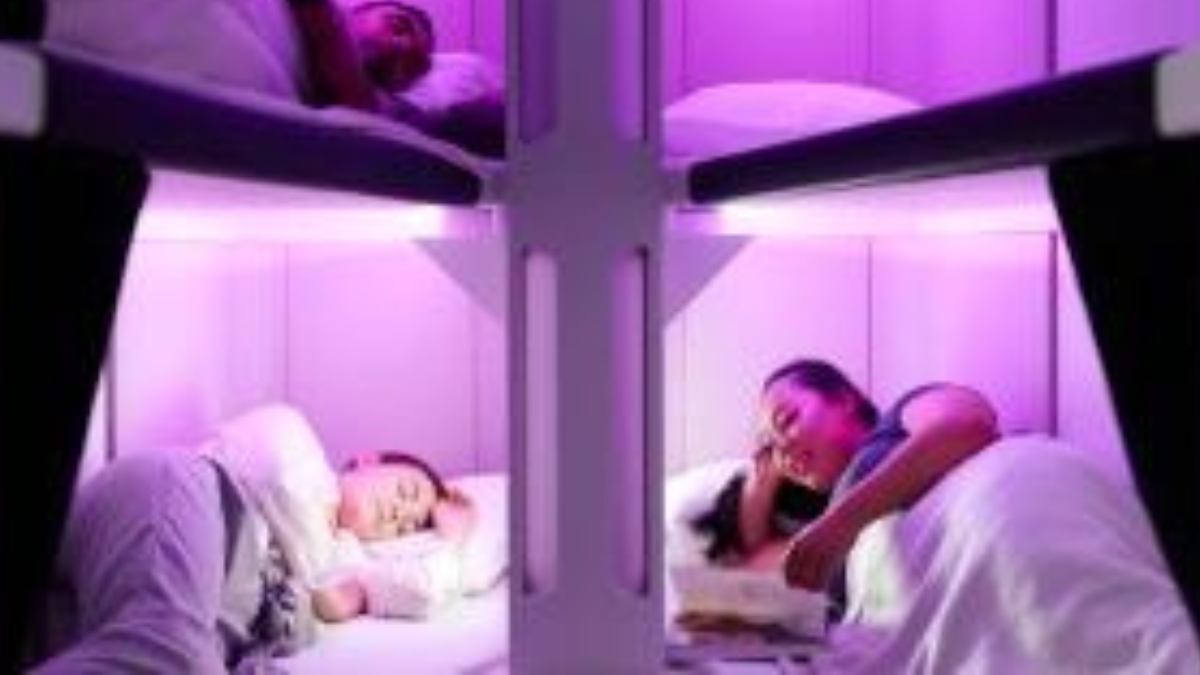
It’s pretty difficult to get comfortable when you’re up in the air, but recent innovations might make air travel flying more tolerable.
The Crystal Cabin Award 2023 Shortlist is out, and the entrants show there is a focus on comfort and accessibility.
The shortlist provides insight into what the future of flying might look like.
“With passenger numbers resurgent following the collapse of 2020, aviation has once again set its sights high,” Crystal Cabin Awards said in a press release.
“To make flying more attractive, sustainable and comfortable, passenger solutions have become an even higher priority across the industry than ever before. In 2023, the annual Crystal Cabin Awards will once again serve as a trend indicator for what might could by in the skies tomorrow.”
For the 2023 awards, more than 80 entrants made the shortlist, with the winners to be crowned later this year.
Flat-lying might be the future
Among the entrants for the award is Air New Zealand, for its Skynest offering.
With Skynest, economy passengers will be able to book a flat bed on long-haul flights to get some sleep.
The sleep islands, with bunk beds, are installed in the middle section of the Dreamliners and should be up in the skies by 2024.
For Premium Economy, the Paradym concept by Lift Aero Design would mean passengers could fold up the arm rests and use a row of seats as a bed.
The design also includes double arm rests, which means no more fighting for one.
Hoping to innovate and simplify, Paradym promises to optimise revenue opportunities for airlines while providing enhanced comfort for long-haul travellers and support sustainability efforts.
Being stuck in the middle seat might also be a thing of the past with Taller De Arquitectura T36’s Multicabin concept, which consists of two Economy levels, with rows of two seats, but overall, more seats in the cabin.
The Spanish architecture company’s design also gives travellers real and virtual windows.
Airline classes reimagined
Also for Premium Economy, American Airlines teamed up with Teague to redesign cabins on both wide and narrow aircraft.
By putting the screens and trays for the front Premium Economy row on a partition, American Airlines is forgoing the requirement for screens and trays to be built into those seats.
Other innovations could shake up how things are done in all classes. Lufthansa Group’s Allegris will create a whole new air travel experience for First, Business, Premium Economy and Economy classes.
The German airline will be offering double suites in First Class, with two large seats to form a bed and complete privacy with floor-to-roof walls.

The Lufthansa Group’s Allegris promises a luxurious First Class flying experience.
In Business Class, customers can expect “more flexibility than ever”, with suites that come with a wardrobe and personal minibar and options on what seat travellers want: An extra-long bed or extra space and work area, a seat with a baby bassinet or a window seat.
Premium Economy travellers will get extra leg room and a foot rest and a sustainable travel amenity kit. Economy travellers will also get some extra leg room.
Barrier-free and sustainable travel
Several entrants for 2023 were working towards making flying more accessible, with many ideas focused around Urban Air Mobility.
Supernal with Formation Design Group has ideas for barrier-free use of air taxis from the gate to exit, while Virginia Tech and Michigan State University have come up with ideas to make air travel more safe for wheelchair users.
Although air travel isn’t seen as sustainable by many, the Crystal Cabin Award jury hopes to recognise those who innovate to make a difference for the environment.
“Here, change often begins with reduced materials use, recyclable components and waste reduction,” the awards said.
One example of an entrant trying to innovate and cut down on waste is from Lufthansa Industry Solutions with its Food Waste App.
The app uses AI and measures what food passengers don’t eat while on the flight and then makes suggestions for the next catering plan.
Airbus Operations recycles carbon fibre from its A350 production and mixes it with synthetic resins from byproducts of sugar cane processing to make its BioMat side panel.
Austrian company F/List has two bio-based materials up for the awards which will be introduced into cabins. The first being a linoleum made from natural components and the second being a plant-based leather.
